by Noel Alberto, FINDink Contributor
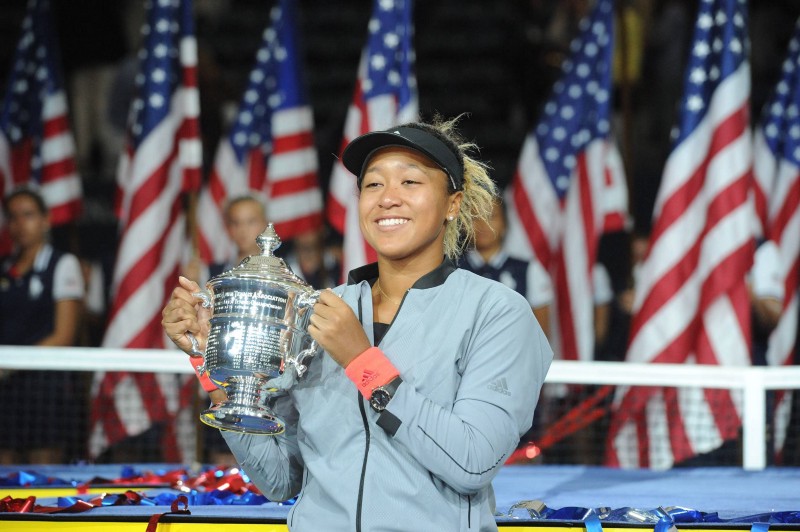
Naomi Osaka is the reigning US Open and Australian Open champion. She is of Japanese-Haitian descent but also identifies as an American (Photo by USTA)
Binhi: Growth Through Action. The theme of FIND Dialogue 2018. Breaking Barriers. The theme of MAUVSA Advance Conference 8. Through growth, each of these professional athletes have broken barriers. In Hollywood, Crazy Rich Asians was important for Asian-Americans because it gave us full representation (the cast was all Asian/Asian-American).
While the breakthrough eventually came for Asian-Americans on the big screen, there is a scarcity of Asian-Americans in sports. The NCAA database has a demographic that shows that in the four major sports (basketball, football, baseball, and hockey), less than one percent of the total players are Asian-American. Granted that database isn’t taking into account women’s only sports or other sports such as swimming or track and field, it’s still difficult to believe that the number of Asian-American athletes will be significantly greater than one percent.
Naomi Osaka’s win at the US Open last year really shone a light on Asian-Americans and people of mixed descent in general. Osaka is of Japanese-Haitian descent and embraces both sides. Being a Grand Slam champion has helped Japan slowly come to terms in acceptance of people who are mixed. While Osaka has Japan and Haitian blood, she does consider herself American too having trained here most of her life.
Despite that, the world number one has largely been overlooked by the USTA. That was until 2016, and now she’s won the last two majors, the US and Australian Open, and looking for a third at the French. Osaka is now the new face of Asian-American sports along with the Toronto Raptors’ Jeremy Lin who recently won an NBA title.. She’s shy and humble but still has a comedic, loving nature to her which brights up the press rooms she’s in. For example, I had asked her at the US Open if she had seen Crazy Rich Asians, and here was her response after some back and forth, “Oh Crazy Rich Asians, I thought you said crazy rotations”
She has endorsement deals with Nike, Nissin, Nissan, Yonex, and ANA. Nike has given her the green light to put sponsors on her shirt, only the second time that’s been done since two-time Grand Slam champion Li Na did it. She’ll soon be designing her own attire and getting her own line of streetwear so more is to come from the 21-year-old.
Culture plays such a massive role for Asians. Growing up, we’re instilled with a set of values and beliefs that we are supposed to abide to for the rest of our lives. From hard work to being family-oriented to focusing on school, these are just some values that are taught to us at a young age.
At the US Open and through e-mail, I had the pleasure of interviewing Osaka, Nathan Adrian, and many other Asian-American athletes asking what from their culture they still use today, their role models, turning points, and much more.
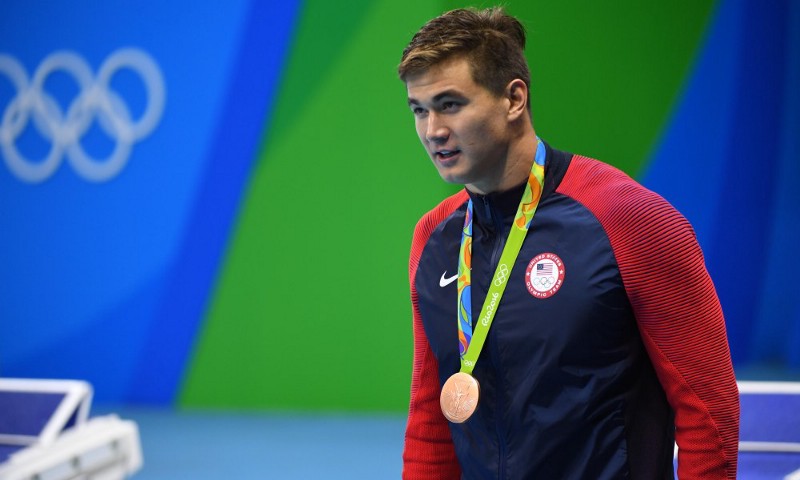
Nathan Adrian is a former Olympic gold medalist and is half-Chinese (Photo by USA Today)
What did you integrate from your culture growing up? What do you integrate from your culture now?
Vania King: I will never truly understand what significance my culture has in my life. When I was younger, I was more culturally Taiwanese than I am now. My parents are first-generation, they didn’t know anything different and how to integrate us into an American culture nor did they want to. They wanted us to be Taiwanese. As I got older, it was difficult to navigate that balance of being American and Taiwanese especially with my family.
Asian cultures are group-minded/collectivist. My parents were quite controlling as many Asian parents are. It took a lot of courage to breakaway from my parents. They mellowed out over the years, but it took a “jackhammer” to breakdown those cultural differences.
Thai-Son Kwiatkowski: I eat a lot of Viatnamese food, my mom makes some great pho. It’s awesome we live in a time where we can show we’re proud of our cultural roots. Movies such as Crazy Rich Asians and Black Panther come to mind in setting a precedent for minority groups to feel comfortable.
Sophie Chang: I grew up definitely eating the cuisine a lot. It was a normal part of my life. When we visited our relatives on my dad’s side, we would get those little red envelopes on Lunar New Year.
Grace Min: I grew up speaking Korean, my parents are Korean and it was my first language. I really appreciate it. I eat Korean food, and I try to keep those a part of my life as an adult.
Evan Zhu: Food, my mom cooks Chinese food everyday. Values. Always work hard, try your best, family is very important. The main thing is discipline and working hard everyday.
Danielle Lao: Being Asian-American having a normal school life and balance was important. A lot of players who are serious about their tennis at a young age are homeschooled or do independent study. It was important for my parents to see me in a regular high school than college.
Claire Liu: My parents wanted me to do well in school. They think the discipline and responsibility of doing your work on time comes in handy especially in tennis because you’re the only one on the court so you have to problem solve on your own.
Nathan Adrian: Yes but I am not necessarily conscious of it. I am mixed so growing up a lot of things that seemed normal to me were actually a hybrid of both of my parents own cultures and senses of self. If eating any and all noodles with chopsticks counts that is something that I do. Growing up we spent a lot of time visiting family in Richmond British Columbia, which has a large Cantonese population.
We would go up there for Chinese new year along with other various holidays and II didn’t realize that every family didn’t have a ton of close relatives and have giant family gatherings centered around 3+ hour meals where everyone sits around and talks.
Bryan Clay: A few things from my childhood that I integrated into my career and life now is the concept of excellence and hard work. My grandfather taught me by example that hard work pays off and that my work ethic speaks volumes about what type of person I am. I believe these two qualities along with many others helped me become the athlete that I am.
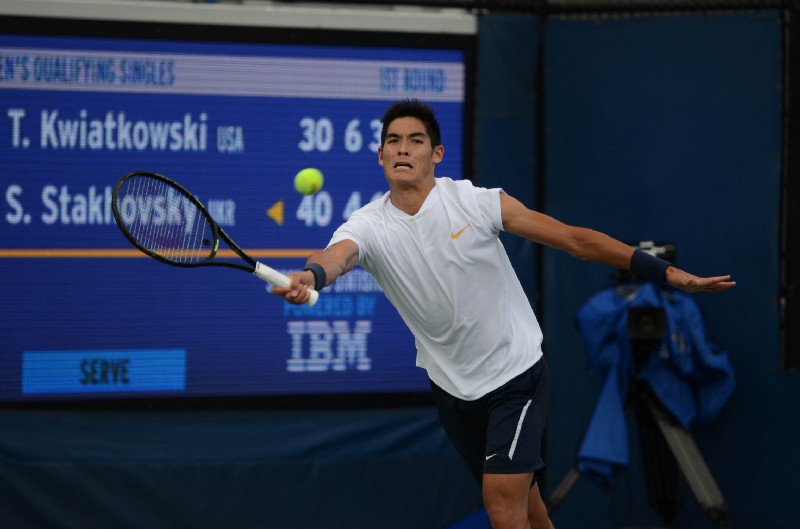
Thai-Son Kwiatkowski is a former NCAA singles champion from the University of Virginia (Noel Alberto/VAVEL USA)
Do/Did you have an Asian-American role model growing up?
Vania King: No not really. I have always been strong-willed and have admired people who were strong-willed. When I was younger, I watched Michelle Kwan. Now that I’m older, I appreciate more character and values that I admire. Culture doesn’t play so much a role in that.
Thai-Son Kwiatkowski: No, politics aside. Barack Obama is a great, affable man. In terms of sports, Kei Nishikori has done an admirable job setting an unbelievable model for treating everyone with respect.
Sophie Chang: My dad always knew the famous Asian-American famous actors such as Jet Li and Bruce Lee. I picked that up growing up. My dad is a great role model. He’s very level-headed, a great parent.
Grace Min: In mainstream media, not really. I would say Michael Chang but not really. I think Li Na definitely when I first turned pro, and I saw her winning Grand Slams. Sadly no, I didn’t have any idols or heroes growing up.
Evan Zhu: Tennis. Michael Chang. Growing up, there’s not too many actors.
Danielle Lao: All Asian-Americans look out for Michael Chang but that’s pretty much it. When you look at the Olympics you look at Michelle Kwan, but there weren’t that many. When I got to college there was Jeremy Lin who led the way. They’re spread out throughout the years.
Claire Liu: Li Na. Also, I loved Gemma Chan because I watched Crazy Rich Asians.
Nathan Adrian: Absolutely! It was hard to grow up without watching Bruce Lee movies. I think as a kid you grow up watching those movies because you think Kung Fu is cool, however, as I got older I grew to respect what he did for Asians in pop culture along with his dedication to his craft.
Bryan Clay: No, I did not have any Asian American role models growing up.

Michael Chang is someone mentioned by many as a role model especially being an Asian-American who’s played tennis (Noel Alberto/VAVEL USA)
What was the turning point that helped you decide that you were going to pursue your sport full-time?
Vania King: My mom told me I wasn’t going to college (see next question for more details).
Thai-Son Kwiatkowski: I’ve been playing tennis since I was seven years old so it wasn’t that hard to decide.
Sophie Chang: I committed to go to college at UVA, the University of Virginia. Close when I was about to go there, I played that summer fully. When I played those three months, I started having better results, and I started to think, Oh I have a good shot at this.”
Grace Min: Winning the Junior US Open. I know it’s only a junior tournament but just being here and experiencing a Grand Slam atmosphere, I knew I wanted to dedicate my life and future to becoming the best pro.
Evan Zhu: I started playing tennis when I was eight. My parents were super big into school and studying. My parents saw me succeeding so they sent me to a tennis camp in Maryland (JTCC) until I was 16. I moved out to California to train with Taylor Dent and now in Texas with Taylor Dent.
Danielle Lao: At the end of my time at USC, I was a little conflicted. A lot of my other Asian-American peers were looking for jobs. I did an internship which set you up, but I sat on it for a couple of months after the school year ended. During the summer, I reflected if I wanted to keep going. I questioned if I was good enough, but I really love tennis and competing so I gave it half a year. That half a year turned into a year and there was a lot of success and now here I am.
Claire Liu: A year ago when I got a wildcard into qualifiers and then qualified for the main draw. I was doing well in juniors and then beating some of the pros was a turning point for sure.
Nathan Adrian: There was no one inflection point that got me to say “I am going to do this full time.” I think it was more along the lines of seeing professional swimming evolving before my eyes as a kid and working at making that a reality.
Bryan Clay: The turning point for me didn’t happen in just one day. It was a slow turn, it happened over years and with refinement of many challenges.
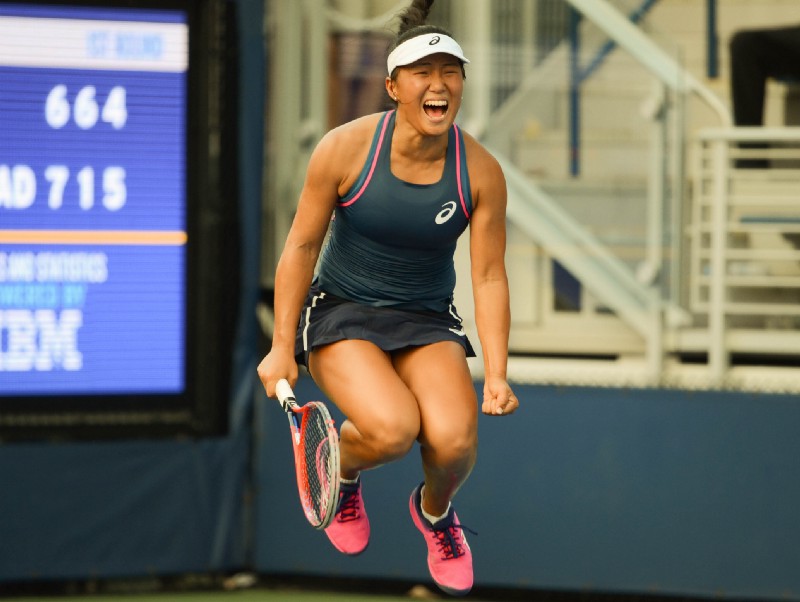
Claire Liu is a former Junior Wimbledon champion (Noel Alberto/VAVEL USA)
Were your parents/guardians fully supportive of what you wanted to do or did they want your focus elsewhere?
Vania King: Yes and no. I wanted to go to college, I was accepted and enrolled into Stanford when I was 17. At the same time, I started playing well, and I was top 100. I had to make a decision since I was going to school in the fall, and I was top 100. I remember distinctly I was at Wimbledon and had to make the decision.
I called my parents and told them I wanted to go to college and my mom said, “No.” I was like, “No? No?!” and she said, “No you can’t.” I was still young, and when I was younger I obeyed my parents more. Now we have a two-way relationship.
Back then, I obeyed because they had the best in mind for me. It was very tough because I’m not Taiwanese, I’m American. I struggled for several years trying to be my own person with the decision that wasn’t the one I originally wanted. It has helped me become the person who I am. I have no regrets, and I learned that I do love tennis and it has given so much to me.
Thai-Son Kwiatkowski: Yea. Obviously coming from an Asian family, academics was important. They never told me academics was what I had to do with my life. If I wanted to be a tennis player then I can be a tennis player. It’s been awesome to have their support.
Sophie Chang: Yes my parents were very supportive. They said it was my choice which was hard at the time because I wanted someone to make the decision. They were proud of me either way. I’m appreciative of it now because I was able to go out and do what I wanted to.
Grace Min: Yes, my parents were much more into sports than academics actually. They were fully supportive of my professional career.
Evan Zhu: Yes. My parents saw me succeeding at around 12-years-old so they sent me to a tennis camp in Maryland. They were supportive of me moving out to California to train and the same in Texas.
Claire Liu: My parents wanted me to college, but my mom helped me make the decision to go pro. She said if I really wanted to play tennis, to put all of my effort into that. After you can go to school or keep learning on your own.
Nathan Adrian: As long as I maintained good grades in school they were happy to support my participation in sport. I think they appreciated the opportunities that Swimming would bring me as a young adult as they watched both my brother and sister get recruited to Division 1 schools.
Bryan Clay: My mother was always supportive of me running track and field. The only other thing she wanted me to accomplish was good grades in school.
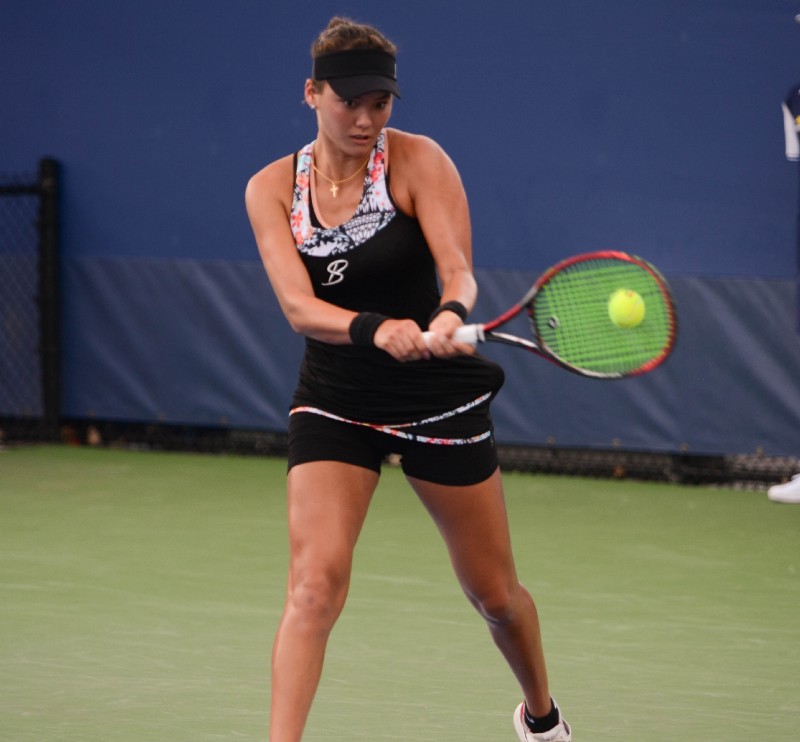
Sophie Chang is a 22-year-old from Maryland with a Chinese background (Noel Alberto/VAVEL USA)
Tips for young Asian-Americans trying to make it into sports?
Vania King: Not just for the athlete but for the family, let the kids enjoy playing and be independent. Let them enjoy the desire to discover things on their own. For the up and coming athletes, you have to put in the work, put in the discipline. If you do, keep pursuing that.
Thai-Son Kwiatkowski: Genetically we are smaller than other races, but we have some cultural diligence and tenacity that we can use to our advantage and always work hard.
Sophie Chang: A lot of Asian Americans are raised to work hard and be disciplined. I know a lot of kids who are spread really thin, but success is something that comes with hard work. It’s hard to succeed in everything at once, you don’t want to put too much pressure on yourself. You want to have fun, you want to enjoy and have love for the sport. That’s where the success comes from.
Grace Min: I didn’t see much diversity in the South, especially growing up and playing in the suburbs of Atlanta. If you don’t see familiar faces, just keep pursuing your dreams and never give up.
Evan Zhu: When you’re young, it’s okay to play a few different sports. When you’re older though, it’s more difficult to excel in multiple sports when you’re doing other things after school. If you like something, commit and represent.
Danielle Lao: Be open with your parents in terms of how much a sport means to you. A lot of times, Asian parents put us through a sport just as an extracurricular. If parents think that it’s still an extra curricular then that’s how they’ll treat it. If there’s a desire for the kid in the sport than they have to show it. The thing about Asian-Americans too is that they’re respectful, they’re obedient. Speaking their mind or speaking out is a challenge in some cases but communicate respectfully because your parents will help you pave the way.
Claire Liu: Most important thing is to have fun. There are some crazy tennis parents. The days off are the most important so you can do other things that you love.
Nathan Adrian: I think the best tip I could give anyone doing anything these days would be to learn how to compartmentalize your time. When working on school work put 100% of your energy and effort in to school work. Same thing applies when you are doing your sport or anything else for that matter. It doesn’t do anyone any good for you to be present physically but mentally be elsewhere (preparing for a test at practice or thinking about your next training session while at school).
Bryan Clay: Culture plays a huge role in who you are weather you want to admit it or not. Don’t be ashamed of where you come from. Harness the good qualities and have respect for the ones you don’t agree with. Then take on the ups and downs in life and capitalize on both. Everything you experience is an opportunity.
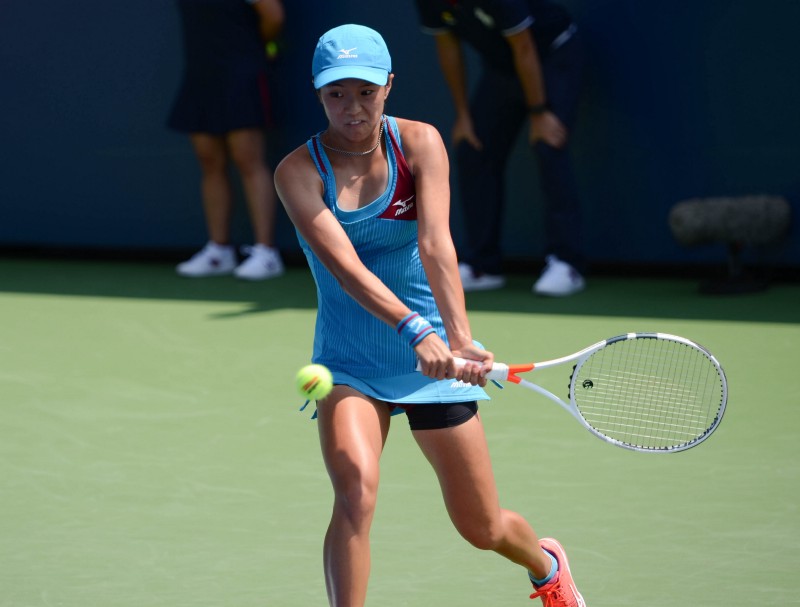
Danielle Lao is of Chinese-Filipino descent and was a two-time All-American at USC (Noel Alberto/VAVEL USA)
Thoughts on Crazy Rich Asians?
Vania King: I thought it was so funny, I cried at the end. I had to look up the mahjong scene. It’s slightly less about Asian values and more about upper-class values. We relate to it a lot.
Evan Zhu: I didn’t see it yet (at the time). But in terms of Fresh off the Boat, I see the similarities between my mom and the mom from the show. My mom was strict but nothing like a tiger mom.
I resonate most with the oldest sibling from the show because he’s very into pop culture, especially rap.
Claire Liu: I just love the whole movie because an Asian cast. I just felt so represented and proud.
Naomi Osaka: Yeah, I think it’s really cool. I know that there hasn’t — like, other than Lucy Liu, there is not a famous Asian lady, if you know what I mean. So I think it’s really cool that they’re casting Asian people now for Asian roles. Yeah, I know that there is a live action Mulan coming out, so I’m excited to see that, too.
Disclaimer: The views of the author do not necessarily represent the views of FIND, Inc.